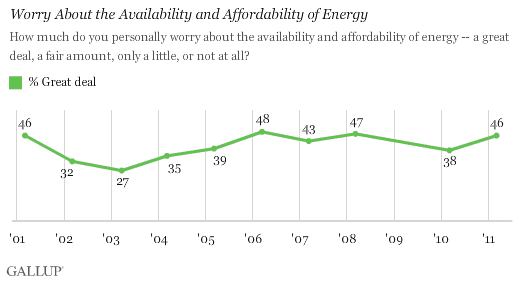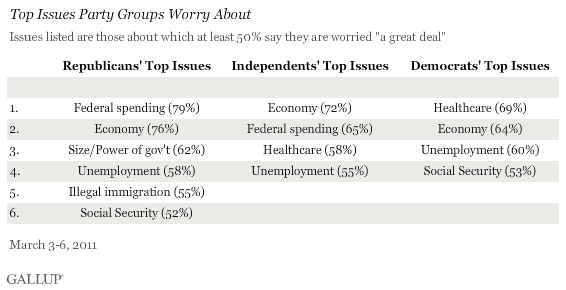PRINCETON, NJ -- Nearly three in four Americans (71%) say they worry about the economy "a great deal," more than worry about 13 other issues Gallup measured in a March 3-6 poll. Nearly two in three (64%) worry a great deal about federal spending and the budget deficit. Americans show the least anxiety about race relations -- the only issue about which the majority is "only a little" or "not at all" concerned.

Gallup measures Americans' concern about major issues confronting the country each March as part of its annual Environment poll. This year's survey was conducted before a 9.0 magnitude earthquake struck Japan on March 11, launching a series of events that has sparked a nuclear crisis in that country and has raised Americans' concerns about the safety of nuclear power.
Gallup has tracked 10 of the 14 items measured this year every year since 2001, except for 2009. Federal spending/the deficit as well as the size and power of the federal government -- both hallmark concerns of the national Tea Party movement -- are new to the list this year. The "possibility of future terrorist attacks" was added to the list in 2002 and Social Security in 2005.
The availability and affordability of energy is the only issue about which Americans have grown significantly more worried since last year, from 38% to 46%. The current level of concern about this is similar to what it was from 2006 to 2008.

Partisans Share Economic Concerns, Differ on Deficit and Healthcare
The economy and unemployment are top-ranking concerns for Republicans, independents, and Democrats. Additionally, majorities of Republicans and Democrats are highly worried about Social Security.
Beyond these areas of common concern, however, the parties diverge. Large majorities of Republicans say they worry a great deal about federal spending (79%) and the size and power of government (62%), and 55% worry a great deal about immigration. All of these issues are absent from Democrats' top concerns. In contrast, Democrats' top-ranking issue -- healthcare -- is not a great concern to most Republicans.
Among the four issues of concern to a majority of independents, the economy and unemployment are issues they have in common with both major parties, while federal spending is primarily a Republican concern and healthcare, a Democratic one.

Also of note, women are significantly more likely than men to be worried about healthcare, hunger/homelessness, Social Security, crime, unemployment, the environment, and drug use.
Young adults aged 18 to 34 are significantly less likely than older Americans to be concerned about Social Security and the size and power of the federal government. Young adults are significantly more likely to be concerned about the quality of the environment.
Bottom Line
Americans' economic anxiety has not abated over the past year, as 7 in 10 Americans continue to tell Gallup they personally worry a great deal about the economy. This has ranked as Americans' top concern on this measure since 2008. Healthcare led the list from 2002 through 2007 and remains among the top five today.
This year's additions reveal that federal spending and the budget deficit worry Americans nearly as much as the economy. The interesting distinction is that all three party groups worry about the economy, while the deficit concerns far more Republicans and independents than Democrats.
Survey Methods
Results for this Gallup poll are based on telephone interviews conducted March 3-6, 2011, with a random sample of 1,021 adults, aged 18 and older, living in the continental U.S., selected using random-digit-dial sampling.
For results based on the total sample of national adults, one can say with 95% confidence that the maximum margin of sampling error is ±4 percentage points.
Interviews are conducted with respondents on landline telephones (for respondents with a landline telephone) and cellular phones (for respondents who are cell phone-only). Each sample includes a minimum quota of 150 cell phone-only respondents and 850 landline respondents, with additional minimum quotas among landline respondents for gender within region. Landline respondents are chosen at random within each household on the basis of which member had the most recent birthday.
Samples are weighted by gender, age, race, education, region, and phone lines. Demographic weighting targets are based on the March 2010 Current Population Survey figures for the aged 18 and older non-institutionalized population living in continental U.S. telephone households. All reported margins of sampling error include the computed design effects for weighting and sample design.
In addition to sampling error, question wording and practical difficulties in conducting surveys can introduce error or bias into the findings of public opinion polls.
View methodology, full question results, and trend data.
For more details on Gallup's polling methodology, visit www.gallup.com.
